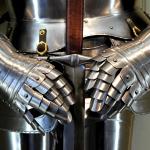The day after Atretes visit, a guard comes in and tells Hadassah that the best way to ensure that she and the others go quickly and with as little pain as possible, when thrown to the lions, is to spread out and move around quietly and slowly, so that the lions will know they are alive and not a threat. “The end will come more swiftly that way,” he tells her. She thanks him.
After this, the guards come and this week’s crop of Christians are ushered out of their cell and into the arena to face the lions.
Hadassah looked up at the mass of people, drunk on cruelty, screaming for blood, her blood. “God have mercy on them,” she whispered, her eyes welling with tears.
At the entrance of the lions, Hadassah faltered. She called on Jesus for strength.
The calmness came upon her again, washing away the fear and filling her with joy that she would suffer for the Lord.
Last week, Melissa, a regular commenter with training in ancient history, noted that for many Christians, martyrdom likely offered a feeling of control over their own fate, which could have been powerful in the face of sickness, disease, and the many causes of ailment and death present in the lives of those who inhabited the Ancient Roman Empire. I find it interesting to bear that in mind, reading this section, whatever ahistorical stereotypes guided Rivers’ pen.
“Mama, I’m afraid,” a child whimpered.
“Remember the Lord,” her mother answered.
“Yes,” Hadassah said, smiling. “Remember the Lord.”
Of all the things I now find repugnant about the Christian obsession with martyrdom, it is the willingness to sacrifice children. I would say whatever was asked of me to protect my children. You want me to espouse a given political ideology, or convert to a specific religion? If you’re holding a gun to my child’s head, I will do it.
When I was a child growing up in an evangelical home, my mother read aloud books of martyr stories at the kitchen table. I remember one where a man refused to deny Christ even as he watched men torture his son, driving nails under the child’s fingernails. All the father needed to do was say “I deny Christ, he means nothing to me,” and it would have ended. In another story, a group of Christians in North Korea was forced to watch while steamrollers drove over their children. The book described the sound of the children’s skulls popping. The parents could have saved their children in an instant by recanting of Christianity, but they refused.
Even so, here we see a child die a horrific death, due to her parents’ refusal to burn some incense and say a few words. There is a world of difference, in my eyes, between Hadassah’s choice, and this mother’s choice. Do the (frequently mythological) stories of early Christian martyrdom state whether children, too, were thrown to the lions? Were children expected to burn incense and pray to the emperor, or was this something required only of adults? I suddenly find myself curious. Perpetua and Felicitas’ babies were not thrown to the lions, after all.
Regardless, Hadassah walks to the center of the arena and begins to pray. “Seeing she was alive and no threat,” a lion heads for her. Here, Rivers draws the curtain—or rather, changes perspective.
Now we turn to Marcus, who is at the games with Julia.
Marcus, whose marriage proposal Hadassah so recently turned down, has come to the games to forget—and because Julia begged him to. As the games begin, he stands to go get some wine—but Julia stops him.
“I have wine, plenty of it, the best quality. Don’t leave. The games are beginning.”
Marcus immediately realizes that something is wrong.
“What’s wrong, Julia?”
“Nothing’s wrong, except that I want things to be the way they used to be between us. I want to go back to the way things were in Rome, before I married Claudius, before anyone came between us. Do you remember the first time you brought me to the games? I was so excited. … Things will be the way they were, Marcus. I promise you. After today we’ll forget everything that’s happened between then and now. We’ll forget everyone who’s hurt us.”
Julia has miscalculated so badly it is almost painful. I’m not sure I’ve ever read any other story where a woman overheard her brother being jilted by a woman he had hoped to wed, and immediately followed up by having that woman killed—all the while thinking he will thank her for doing it. There has to have been an awful lot of lotus eating and wine involved, because I do not see how this logic holds up at all.
“Do you love me, Marcus?” she asked, her eyes intent.
“Of course, I love you.”
But not the way he once had,s he knew. His expression became guarded, pained. All that would change soon. Today would wipe away the past and avenge his wounds—and hers.
This would make a lot more sense if Julia had overheard the exchange between Marcus and Hadassah and been horrified that her brother had been willing to expose the family to the ridicule that wedding a slave would bring. Turning Hadassah over to be thrown to the lions would have been a way for her to eliminate a threat to her family’s station and reputation—and, she might have thought, a cold wake-up call to her brother. She could very well have said she was doing it for him—to protect his standing in society. But that is not what’s going on here.
“Let’s watch, Marcus. You’ll see what I’ve done for you.”
A chill of premonition swept through him. “What have you done?” he asked, willing his voice to be calm and steady.
At this point, the gates open. “Do you see?” Julia asks. “Christians!” Marcus begins to freak out, searching the sand below until he locates Hadassah.
“What have you done, Julia?”
“I heard what she said to you! I heard her throw your love back in your face. She preferred her god over you, and you said her god could have her. Well, now he shall.”
“You arranged this?” His voice was filled with desperation and loathing. he tore his hand from her, wanting to strike her. “You did this to her?”
Julia tells Marcus that she took Hadassah to Vitellius’ feast, and the yelling begins in earnest. At no point does Julia mention that Marcus was willing to risk her family’s reputation, in proposing to Hadassah. Instead, she rails against Hadassah for putting her god above Marcus. “She’s a thorn in my side, and I want her plucked out, destroyed.” Julia says. “I hate her!” Marcus is horrified. “Her life means everything to me!” he cries. “I love her!”
At this point the lions come out. Marcus watches in horror as a lioness hurtles toward Hadassah and tackles her as Hadassah reaches out her arms in an open embrace. Marcus turns his face away in horror, and then looks back at the sand before him.
And in that instant, God answered Hadassah’s prayer.
Marcus looked back, and his eyes were suddenly opened as he stared down at Hadassah, lying crumpled on the sand, her tunic shredded and bloodstained. Two lionesses were fighting over her body, ripping at one another. One bit into Hadassah’s leg and tried to drag her away. The other attacked again.
“I paid her back for what she did to us,” Julia said, clutching at Marcus. “We can forget her now.”
“I’ll never forget her,” he said hoarsely and grasped Julia’s wrists tightly, looking at her as though he were something foul and hateful. “But I will forget you.”
“Marcus,” she said, frightened by the look in his eyes. “You’re hurting me!”
“I’ll forget I ever had a sister,” he went on, pushpin her away from him. “May the gods curse you for what you’ve done!”
She stood staring at him, her face white, her eyes wide with shock. “How can you say such cruel things to me? I did it for you! I did it for you!“
Well this is delightful.
“You want her, Calabah?” he asked, his voice low, filled with loathing.
“I’ve always wanted her,” Calabah said, eyes glowing with black fire.
“You can have her.” And Marcus turned his back on Julia, pushing his way past Primus, who as just returning with the wine bags. “Get out of my way!”
I’m still trying to figure out exactly which prayer of Hadassah’s has been answered, here. I’m pretty sure Hadassah didn’t want Marcus to turn on Julia and hand her over wholesale to Calabah, leaving her with curses in her ears. Where is the answered prayer?
Marcus runs from the stands and through the gates. “He ran to get away from the sound, the smell, the sight that was branded in his mind,” Rivers tells us. He runs until he can run no more, alway through the mostly empty city (everyone is at the games, it seems).
Marcus heard the familiar rumble in the distance … undated humanity. He covered his ears, and a sound came up from deep inside him, a cry of pain and despair, a cry of remorse and guilt. It tore from him and rose, echoing down the empty street.
“Hadassah!”
He fell to his knees. Hunching over, he covered his head and wept.
And there the book ends.
No really—the end.
Now, our review series isn’t quite over. The end of my copy of the book also contains chapter one of book two—a sneak peak to keep the reader hooked—and a Q&A with the author. I intend to cover both.
I do want to mention one other thing, though. Many mental health advocates criticized the teen television series 13 Reasons Why because the series portrayed the aftermath of the an individual’s suicide in a way that felt like wish fulfillment—it seemed to promise teens that if they really wanted to get back at all of those who had bullied or mistreated them, committing suicide was the way to do it, as their death would fill their abusers with remorse and offer the payback they were not able to mete out to their tormenters while still alive. This feels similar.
Hadassah is dead, but her prayer has been answered—and her death will force Marcus to face the questions he avoided while she lived. It is her death that creates the change she was unable to create while still alive. She lives on after the grave.
Well, assumed grave. There can’t exactly be a book two without Hadassah.
I have a Patreon! Please support my writing!















